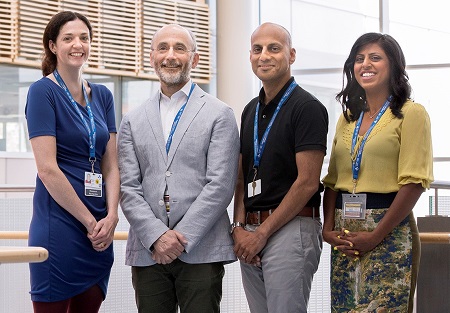Newsroom
Predatory journals: researchers propose solutions to stop the “corruption of science”
December 4, 2017
 The team of researchers behind a landmark study on predatory journals has now outlined the first concrete steps that stakeholders can take to combat the growing influence of these journals. Their pioneering work is published in Nature Human Behavior.
The team of researchers behind a landmark study on predatory journals has now outlined the first concrete steps that stakeholders can take to combat the growing influence of these journals. Their pioneering work is published in Nature Human Behavior.
The team from The Ottawa Hospital and the University of Ottawa suggests:
- Researchers need to be educated on how to identify predatory journals and avoid submitting work to these unscrupulous outlets.
- Research institutions need to provide incentives for their researchers to publish in legitimate journals.
- Funding agencies need to audit where research they are funding is being published and disincentivize further submissions to predatory journals.
- Patients and participants need to apply pressure to other stakeholders to ensure clinical studies are published in the best possible outlets; they can also help identify publications in predatory journals that support ‘fake’ science.
“Predatory journals are corrupting science,” said Dr. David Moher, senior author of the paper. “Relevant policies and actions need to be taken by funders and institutions to fight them.” Dr. Moher is a senior scientist at The Ottawa Hospital and founder of the Hospital’s Centre for Journalology, which studies the science of publication. He is also a professor at the University of Ottawa.
“Predatory journals will remain problematic unless all stakeholders take specific, coordinated actions against them, some of which we have proposed,” said Larissa Shamseer, a PhD student at The Ottawa Hospital and the University of Ottawa and co-author of the study. “Better monitoring of the system of scholarly publishing is needed.”
“Data from millions of patients is being lost in predatory journals,” said Dr. Manoj Lalu, associate scientist and anesthesiologist at The Ottawa Hospital, assistant professor at the University of Ottawa and co-author of the study. “Patient advocacy groups, as well as patient organizations that fund research need to be aware of this massive problem. Policies need to be developed and enforced to fight the growing problem of predatory journals.”
The Centre for Journalology is a world-leader in understanding the importance of helping researchers publish their results transparently and avoid predatory journals. The Centre includes a full-time Publications Officer who provides training and consultations to researchers at The Ottawa Hospital.
“It can be difficult for researchers to stay up to date on publication best practices as the publishing landscape changes rapidly,” said Dr. Kelly Cobey, Publications Officer at The Ottawa Hospital, adjunct professor at the University of Ottawa and co-author of the study. “Institutions need to have support systems in place to guide their researchers in responsible publishing.”
The team has also developed the following resources to help researchers with this issue:
Full reference: “How stakeholders can respond to the rise of predatory journals” is published in the December 4, 2017 edition of Nature Human Behavior by Manoj Lalu, Larissa Shamseer, Kelly Cobey, and David Moher.
What are predatory journals and why are they a problem?
Largely unknown a decade ago, illegitimate or predatory journal journals collectively publish more than 400,000 studies each year. These journals offer to rapidly publish research findings, at a lower cost than legitimate journals, but do not provide quality controls such as peer-review. Predatory journals are also difficult to search, meaning that health-care providers and researchers can rarely learn from the data in these journals.
Recently, a landmark investigation from The Ottawa Hospital and the University of Ottawa, published in Nature, demonstrated that contrary to popular belief, a majority of papers in suspected biomedical predatory journals (57 percent) are from high or upper middle income countries, with many coming from prestigious institutions. In addition, tax-payer supported bodies such as the National Institutes of Health have funded a significant number of studies in these journals. Over 2 million patients participated and 8000 animals were used in the papers that were investigated.
The Ottawa Hospital: Inspired by research. Driven by compassion
The Ottawa Hospital is one of Canada’s largest learning and research hospitals with over 1,100 beds, approximately 12,000 staff and an annual budget of over $1.2 billion. Our focus on research and learning helps us develop new and innovative ways to treat patients and improve care. As a multi-campus hospital, affiliated with the University of Ottawa, we deliver specialized care to the Eastern Ontario region, but our techniques and research discoveries are adopted around the world. We engage the community at all levels to support our vision for better patient care. See www.ohri.ca for more information about research at The Ottawa Hospital.
University of Ottawa: A crossroads of cultures and ideas
The University of Ottawa is home to over 50,000 students, faculty and staff, who live, work and study in both French and English. Our campus is a crossroads of cultures and ideas, where bold minds come together to inspire game-changing ideas. We are one of Canada’s top 10 research universities—our professors and researchers explore new approaches to today’s challenges. One of a handful of Canadian universities ranked among the top 200 in the world, we attract exceptional thinkers and welcome diverse perspectives from across the globe. www.uottawa.ca
Media Contact
Jenn Ganton
Director, Communications and Public Relations
Ottawa Hospital Research Institute
Office: 613-798-5555 x 73325
Cell: 613-614-5253
jganton@ohri.ca
